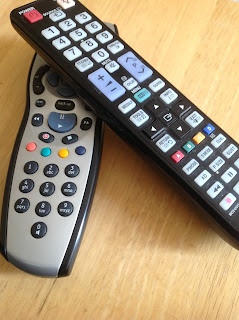
I have tried without success to understand what it is that attracts men to remote controls, especially the TV remote. A lot of men (my husband, the king of them all) find the remote control so irresistible. Once he steps into the living room he goes straight for the remote and for the entire period he spends there I'll have to kiss the remote goodbye.
The fact that they confiscate the remote for the next couple of hours is not really the problem, it is the fact that they are incapable of staying on a channel for more than a micro second. I often wonder how they satisfy that desire to watch a programme on TV ( except the sports channel, if there is some championship or tournament then the TV stays on that channel forever)
I thought I was in this alone until I heard other women complain about the same problem. I have also discovered this is not a problem with men alone but with the entire male gender and they start so young. Its almost as if they have a secret gene passed from father to son and has continued for generations unbroken and unnoticed by women.
Some women have succeeded in getting some remote time while others like myself have given up. As long as I get to watch my favorite programmes, of which i'll have to announce several times for all to hear, he can run around the channels for as long as he pleases.
I have tried and tried to keep the remote away from him and have discovered it is impossible to keep him away from the remote. Men just light up at the mere sight of a remote control and once they get their hands on it they are like a kid let loose in a candy store, they just can't stop.
Ladies, we need to do something about this and fast, maybe declare a ladies remote control day each week, when no male is allowed to get close to the remote.
what do you think?









